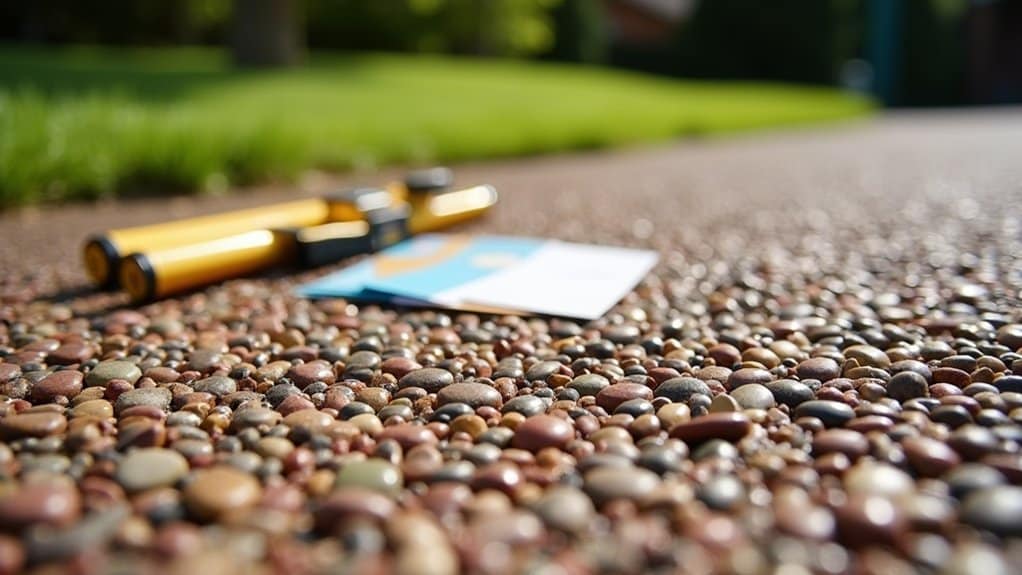The cost of a resin-bound gravel driveway depends on several key factors. A straightforward rectangular driveway typically costs less than one with curves or intricate patterns. Your site’s condition matters too – sorting proper drainage or levelling uneven ground adds to the price. The materials you choose make a significant difference; premium UV-stable resins cost more than standard options, whilst decorative aggregates like granite or marble command higher prices than basic gravels. Worth noting that whilst pricier materials mean a bigger upfront cost, they often last longer and maintain their looks better in our British weather.
Key Takeaways
Cost Factors for Resin-Bound Gravel Driveways:
- The size and layout of your driveway are key price drivers – a straightforward rectangular design costs less than an L-shaped or curved driveway requiring extra labour.
- Ground preparation is vital and affects overall costs. You’ll pay more if your site needs extensive drainage work or levelling – think of it like preparing foundations for a house.
- Material choices matter. Basic gravel blends start around £30-40 per m², whilst premium options with unique colours or sparkle effects can reach £60-80 per m².
- Installation costs fluctuate across the UK. Expect higher rates in London and major cities, with prices climbing further for tricky access or sloped sites.
- Skimping on maintenance proves costly long-term. Regular sweeping and occasional pressure washing (about £100-200 annually) help avoid expensive repairs that could run into thousands.
Driveway Size and Shape

The size and shape of your driveway are key factors in determining resin-bound gravel costs. Your driveway’s dimensions affect the quantity of materials and labour required. A typical two-car driveway costs between £3,500 and £7,800, with larger areas demanding higher budgets. Additionally, average costs for resin driveways range from $11 to $17 per square foot, which can significantly impact your overall expenditure. Properly installed resin bound driveways can last between 15-25 years, enhancing your investment over time.
Complex shapes add to the expense. Curved edges, irregular patterns, and narrow sections need more skill and materials to install properly. These tricky areas often require extra resin and create more waste during fitting. The more complex your design, the more time and resources needed to complete the job.
Before starting your project, it’s worth measuring your space carefully and considering a simpler layout if you’re working to a tight budget. A straightforward rectangular design will cost less than one with multiple curves or decorative features.
Site Preparation and Conditions
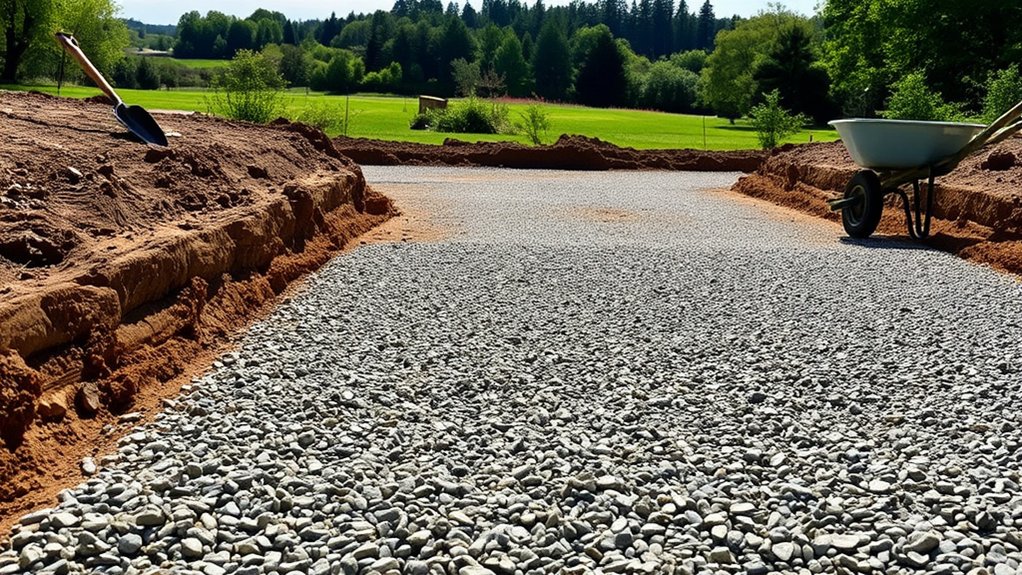
Ground preparation is crucial for resin-bound driveways. Ensure your surface is properly levelled and free from vegetation, as any remaining roots or plants will compromise the finish. Factor in costs for thorough site clearance. Proper drainage is essential – consider installing additional drainage channels if your ground tends to hold water. A well-prepared base will prevent costly issues down the line and ensure your driveway stays looking smart for years to come. Additionally, make sure to install proper edging to maintain the surface integrity and prevent movement. Furthermore, quality materials are vital, as using subpar resources can lead to premature wear and the need for repairs.
Ground Leveling Requirements
Getting your ground properly levelled is vital for a lasting resin-bound gravel driveway. First, dig out old materials to reach roughly 250mm depth.
Check your soil thoroughly – soft or unstable patches need sorting before you go further, or you’ll risk cracks later on. Proper sub-base preparation is essential to provide a solid foundation for the driveway.
The key is laying MOT Type 1 aggregate as your base. Think of it like building a house – without solid foundations, the rest won’t last. A permeable system allows for effective drainage, reducing the risk of water pooling.
Compact each layer properly, much like tamping down soil in your garden, but with heavy machinery.
A level base saves you hassle and money down the line. Skip this step, and you might end up with a bumpy drive that pools water or develops dips – rather like a poorly laid patio that drives you mad every time you look at it.
Vegetation Clearance Costs
The cost of clearing vegetation before installing a resin-bound driveway varies widely across the UK. Several key factors affect the price: the type and amount of vegetation, site access, and disposal fees.
Dense bushes and established trees need specialist removal, pushing up costs. You’ll pay more if there are troublesome root systems to deal with, particularly from plants like Japanese Knotweed.
If your site has tricky access or steep ground, contractors might need heavy machinery, which adds to the bill. Local council fees for green waste disposal will factor into your budget.
Also, if you’re dealing with protected species or trees with preservation orders, you’ll need proper permits – these aren’t cheap.
Most UK contractors charge between £200-£500 for basic clearance, but complex jobs can run into thousands. Getting multiple quotes from local firms is wise, as prices vary significantly by region.
Drainage Considerations
Drainage Considerations
After clearing vegetation, proper drainage becomes vital for your resin-bound driveway. These surfaces naturally allow water to filter through, which helps prevent puddles and flooding.
You’ll need a solid, porous sub-base, typically crushed stone, to let water drain properly.
For areas with drainage issues, adding features like soakaways or French drains makes sense. The driveway should slope gently towards these drainage points – think of it like tilting a tray to guide water in the right direction.
Getting drainage right not only protects your investment but ensures you meet UK SUDS regulations.
These rules help manage rainwater sustainably, which is particularly important given our British weather.
Resin Types and Quality
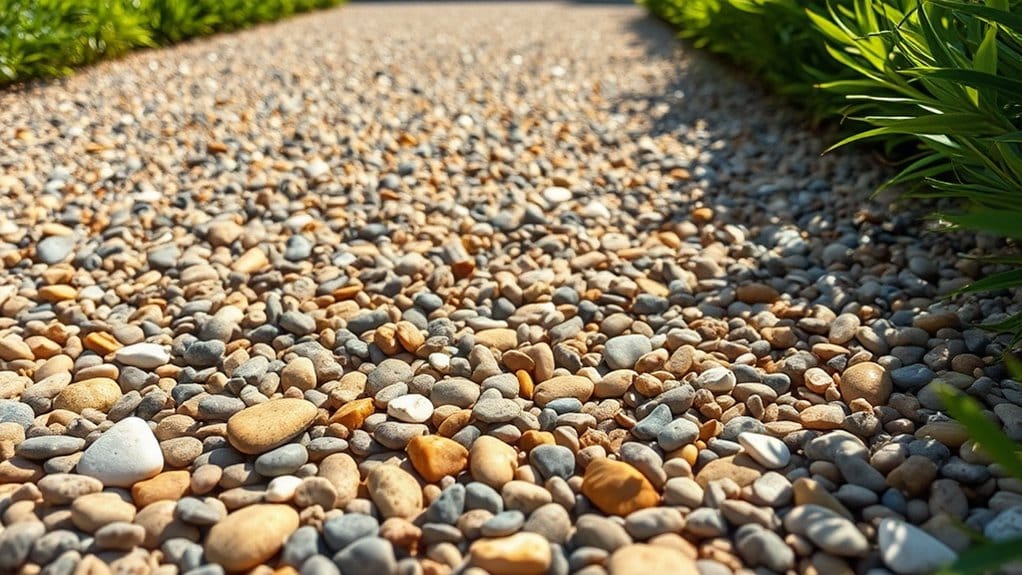
Choosing the right resin is crucial for your driveway’s success. Aliphatic resin stands out for its UV resistance, keeping its colour and strength in British sunshine – rather important for our outdoor spaces.
Aromatic resin, whilst cheaper, tends to fade and break down when exposed to sunlight. It’s worth noting the difference in lifespan: aliphatic resin driveways last 15-25 years, whilst aromatic versions typically need replacing after 10-15 years.
Think of it like choosing between quality outdoor paint and basic emulsion – the better option costs more initially but saves money and hassle in the long run.
To avoid frequent touch-ups and maintain your driveway’s kerb appeal, investing in UV-stable aliphatic resin makes sound sense.
Aggregate Selection and Quality
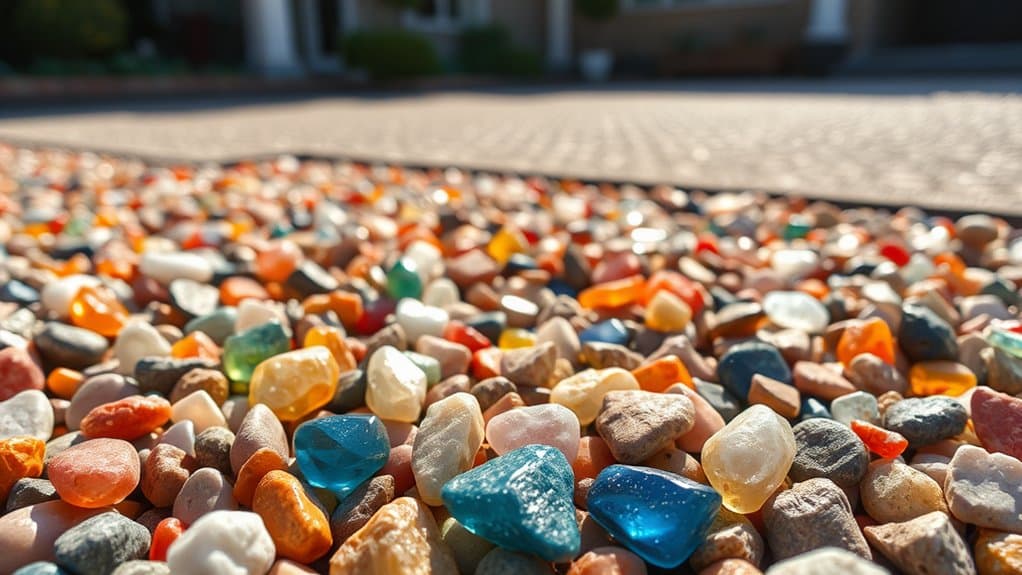
Choosing the right aggregate for your resin-bound driveway is vital for both looks and value. Quality stones range from local gravels to premium granite chips, with prices varying accordingly.
Popular UK options include Cotswold stone for a traditional finish or Yorkshire Cream for a modern look. The stones’ size and shape affect not just appearance but also how well water drains through the surface – particularly important for British weather.
A well-chosen aggregate will ensure your driveway remains attractive and functional for years, so it’s worth weighing up the initial cost against long-term performance.
Aggregate Cost Considerations
Cost Factors for Aggregates
The choice of aggregate significantly affects the cost of resin-bound gravel driveways. Natural stone typically costs more than recycled options, though both can deliver quality results. Consider these key factors:
| Factor | Impact on Cost | Notes |
|---|---|---|
| Sourcing | Local vs. Imported | Transport costs can vary |
| Preparation | Cleaning & Sizing | Steam-cleaning adds costs |
| Performance | Durability & Strength | Harder materials increase price |
Local quarries often offer better value than imported stone, whilst premium aggregates like Cotswold stone command higher prices. Steam-cleaning and precise sizing add to costs but ensure better bonding with resin. Look out for seasonal price fluctuations and bulk-buy opportunities through established suppliers to manage your budget effectively.
Remember to factor in grading certificates and waste removal – these seemingly small costs can mount up quickly.
Aesthetic Impact of Aggregates
The aggregate you choose shapes both the cost and look of your resin-bound driveway. Your selection directly impacts the colour, texture and overall pattern, letting you match either modern or traditional property styles.
Popular options include natural stone, recycled glass and decorative gravel, each bringing distinct visual qualities beneath the clear resin coating.
When choosing, consider how the colours work with your property’s exterior – a well-matched driveway boosts kerb appeal and ties in with your garden scheme.
Quality aggregates keep their appearance longer, whilst textured varieties offer a practical balance of good looks and grip underfoot.
Design and Pattern Complexity
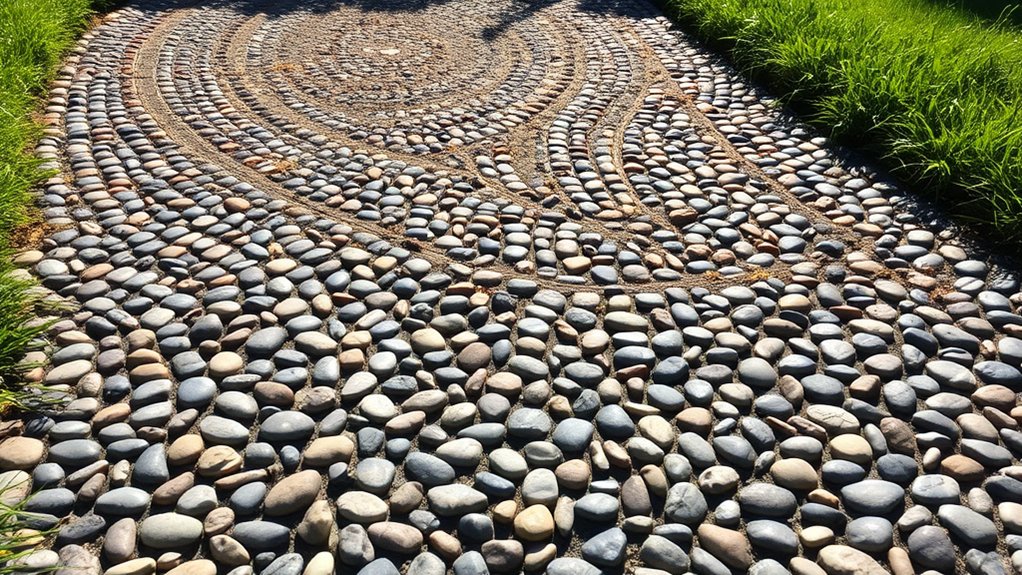
Design intricacy directly affects your resin-bound driveway costs.
Complex patterns require more materials and labour, pushing up the price considerably. For example, creating a herringbone pattern or circular motif costs more than a simple, single-colour finish.
Choosing special colours or premium stones adds to the expense. Whilst standard grey or buff aggregates are cost-effective, bespoke blends like Mediterranean bronze or Yorkshire cream command higher prices.
Detailed borders, such as contrasting edging strips, need additional materials beyond basic requirements.
Multi-coloured designs require separate resin mixes and careful application. A typical example would be combining charcoal and silver grey for a contemporary look, which needs more time and materials than a uniform finish.
The more elaborate your chosen design, the higher your final bill – it’s that straightforward.
Installation and Labor Factors
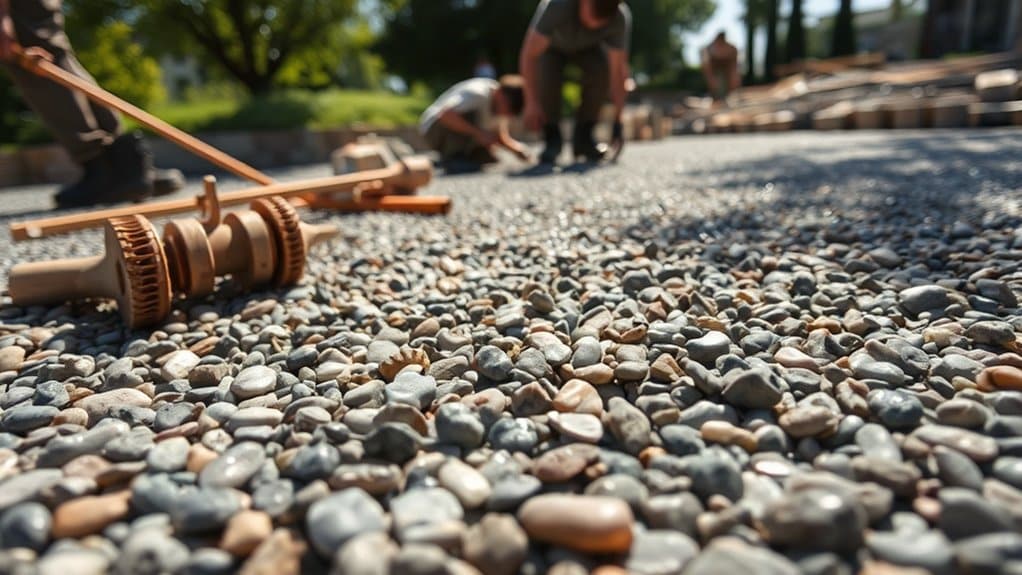
Installation and labour costs for resin-bound gravel driveways vary across the UK, mainly due to workmanship quality and site-specific challenges.
A straightforward driveway on level ground might cost less than one requiring extensive groundwork or dealing with drainage issues. Your location matters too – expect higher rates in London and the South East compared to other regions.
Key factors affecting costs:
- Skill level of installers
- Ground preparation needs
- Site access
- Regional labour rates
- Equipment requirements
For example, a typical suburban driveway might need two days’ work with a skilled team, whilst a sloped or complex project could take twice as long.
Getting quotes from several local specialists will give you a realistic budget range for your specific situation.
Labor Cost Variability
Labour Costs Explained
Labour costs for resin-bound gravel driveways vary significantly across the UK, affecting your final project cost:
- Contractor Skills: Top-rated contractors typically charge more, but they’ll deliver better workmanship and lasting results – much like choosing between a master builder and a general handyman.
- Location Matters: Expect higher rates in London and major cities compared to rural areas. A project in Central London might cost 30% more than the same job in Yorkshire.
- Site Challenges: Steep driveways, intricate patterns or poor ground conditions require extra time and expertise. A straightforward rectangular driveway costs less than one with curves or multiple levels.
Remember to get quotes from at least three contractors to compare local rates and expertise.
Site Condition Impact
Site conditions significantly affect labour costs and installation of resin-bound gravel driveways. Difficult access or uneven ground can extend work time and increase expenses. Consider these key site impacts:
| Site Condition | Labour Impact | Environmental Impact |
|---|---|---|
| Steep Slopes | Extra materials required | Higher erosion risk |
| Limited Access | Slower installation | Greater fuel usage |
| Poor Drainage | Additional drainage work needed | Risk of flooding |
| Dense Vegetation | Extended clearance time | Disrupts local wildlife |
These factors directly influence project costs and timeline – a sloped driveway might need extra groundwork, whilst restricted access could mean manual rather than mechanical installation. Being aware of these challenges helps plan both budget and timing effectively.
Equipment and Material Expenses
Equipment and Material Costs for Resin Driveways
The price of a resin-bound driveway largely depends on your equipment and material choices. Consider these essential costs:
1. Equipment Hire: You’ll need to hire forced action mixers and digging equipment – expect this to be a significant part of your budget. A typical mixer costs £80-120 per day.
2. Materials: Resin and aggregate quality varies dramatically. Premium Materials cost more but last longer – much like choosing between budget and premium tyres for your car.
Standard aggregate typically costs £40-60 per square metre.
3. Extra Bits: Factor in basics like petrol for equipment, mixing buckets, and finishing tools. These smaller items might seem minor but typically add 10-15% to your total costs.
Tip: Always get quotes from several suppliers, as prices can vary significantly across the UK.
Drainage Considerations
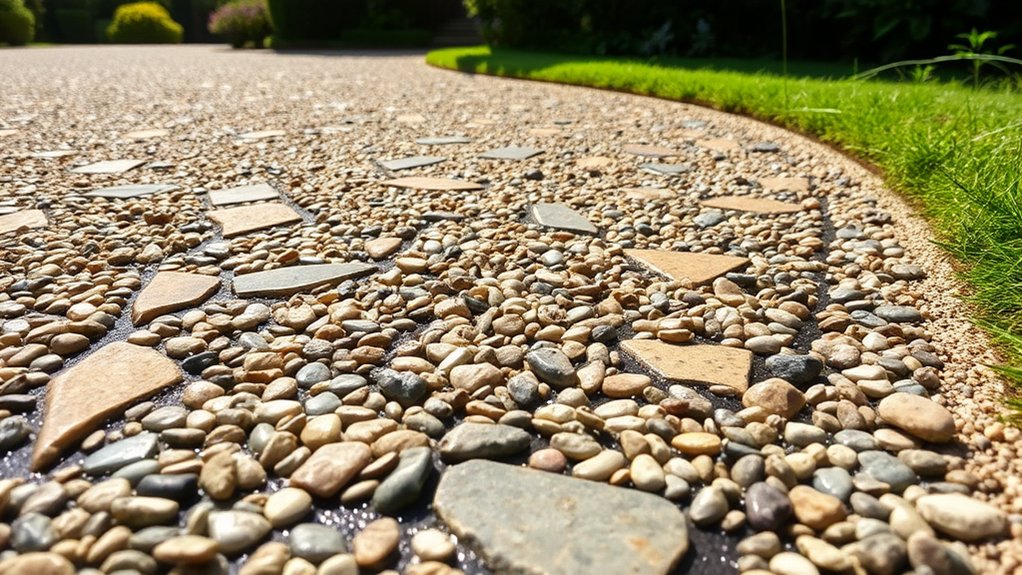
Proper drainage is vital when installing a resin-bound gravel driveway in the UK. These surfaces are naturally permeable, letting rainwater seep through rather than forming puddles or ice patches.
However, if your subbase isn’t porous, you’ll need extra drainage solutions – typically channel drains or soakaways – much like those seen in traditional garden paths.
Think of it as giving water somewhere to go: without proper drainage, you might end up with a flooded driveway during our notorious British weather. Additional drainage features will bump up your costs, and you might need planning permission, particularly in urban areas where surface water management is strictly controlled.
Getting the drainage right protects your investment and helps the environment by filtering out pollutants before they enter the water table. It’s worth sorting at the installation stage to avoid costly repairs later.
Location and Accessibility
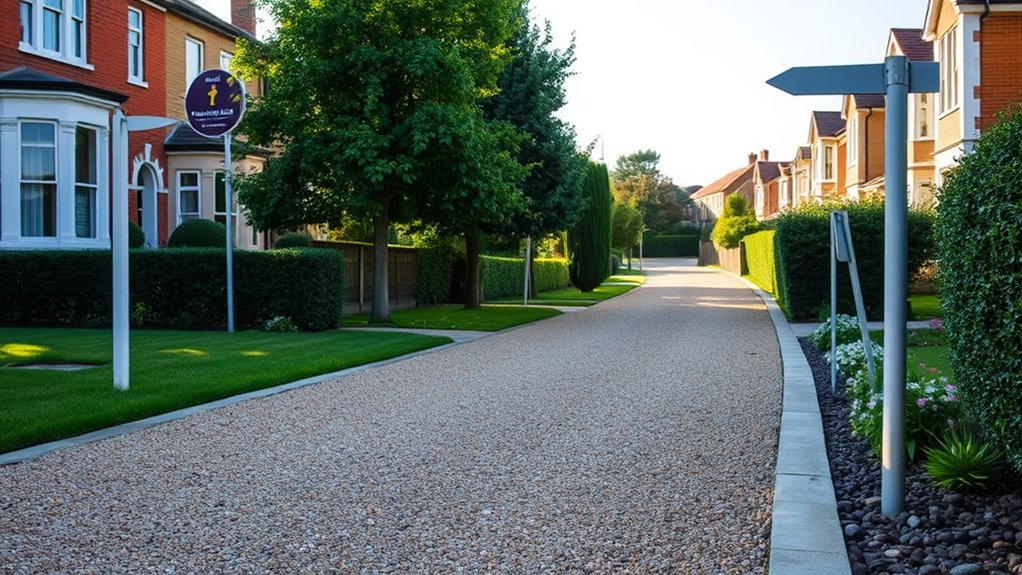
Location and Accessibility
Regional pricing, site access and ground conditions directly impact your resin-bound gravel driveway costs:
- Regional Pricing: Costs vary across the UK, with London and the South East typically commanding higher rates. Local council permits and skip hire fees differ by region, whilst remote locations face steeper delivery charges.
- Access Issues: Narrow lanes, tight corners or restricted access mean contractors might need smaller machinery or more manual labour. A terraced house with no side access, for example, requires all materials to come through the property.
- Ground Conditions: Sloping gardens, waterlogged soil or existing poor surfaces need extra groundwork. Converting an old concrete drive often costs more than working with level, well-draining ground.
These factors shape your final quote – best to discuss them with installers during site surveys.
Seasonal Timing and Weather

Seasonal timing and weather play a crucial role in installing your resin-bound gravel driveway. Spring and summer are peak seasons, which means higher prices from suppliers and possible material shortages. You might save money by scheduling work in late autumn or winter, though weather becomes more challenging.
The British climate poses specific challenges – our cold weather slows down resin curing times, and our notorious damp conditions can interfere with proper bonding. A typical autumn downpour could force work to stop, leading to extra prep costs when work resumes. Think of it like painting your garden fence – you wouldn’t start just before rain.
Winter brings its own headaches, as frozen or waterlogged ground makes groundwork difficult – much like trying to dig your garden when the soil’s rock-hard.
Maintenance Requirements

Maintaining Your Resin-Bound Gravel Driveway
Three essential maintenance tasks keep your resin driveway looking smart and working properly:
1. Regular Cleaning: Sweep surfaces weekly and wash with cold water.
Remove oil marks or spills straight away using a mild soap solution to prevent staining.
2. Weed Control: Pull out any weeds by hand as soon as they appear.
Use a gentle weed killer if needed, but apply sparingly to protect the resin bonding.
3. Surface Protection: Keep heavy vehicles off the surface where possible.
Check car tyres for stones that might scratch the driveway.
Additional Features and Accessories
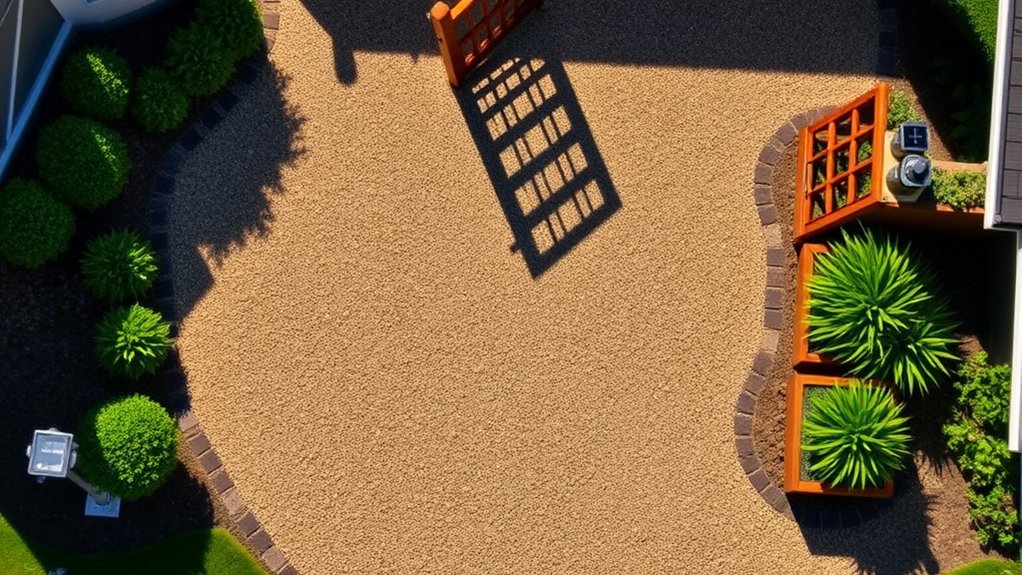
Various features and accessories can boost your resin-bound gravel driveway‘s practicality and looks. Popular add-ons include decorative stones and bespoke patterns to make your driveway stand out.
Safety-wise, non-slip treatments and proper edging are worth considering, especially for British weather conditions.
Good lighting is essential for dark winter evenings – consider LED bollards or ground-level spots.
If you’re environmentally conscious, permeable resin systems help manage rainwater effectively, which is particularly useful given the UK’s frequent rainfall. These systems also comply with local planning regulations for sustainable drainage.
These improvements not only make your driveway more functional but can increase your property’s kerb appeal and value in the British housing market.
Frequently Asked Questions
How Long Does a Resin-Bound Driveway Typically Last?
A well-installed resin-bound driveway lasts between 15 and 25 years, much like a traditional block-paved drive. The surface holds up brilliantly against British weather, from summer UV exposure to winter frost cycles. With proper care and professional installation, your driveway could serve you for over 30 years – about the same time you might keep your house.
Can I Install a Resin-Bound Driveway Myself?
Installing a resin-bound driveway yourself is possible but risky. The process requires significant technical knowledge and precise timing, particularly when mixing and laying the resin. Mistakes can be costly, as damaged areas often need complete replacement rather than simple repairs.
Professional installation is recommended for most homeowners, as the material costs alone are substantial – typically £30-£50 per square metre. The process involves careful substrate preparation, exact resin-to-aggregate ratios, and proper finishing techniques that come with experience.
If you’re determined to DIY, start with smaller projects like garden paths to build expertise before tackling a full driveway.
What Colors Are Available for Resin-Bound Driveways?
A broad selection of colours is available for resin-bound driveways, ranging from classic neutrals to striking bolder shades. Popular choices include traditional greys and browns that match British architecture, whilst contemporary options feature warmer terracotta and modern slate-blue tones. The versatility means you can match your driveway to existing garden features or your home’s exterior.
Is Resin-Bound Gravel Driveway Environmentally Friendly?
Resin-bound gravel driveways offer several environmental benefits for UK homeowners. The permeable surface allows rainwater to drain naturally into the ground, reducing flood risks and supporting local water tables. The material itself consists largely of natural stone and plant-based resins, making it a more eco-conscious choice than traditional concrete or tarmac. Whilst installation requires some energy input, the long-lasting nature of resin-bound surfaces means less frequent replacement and maintenance compared to loose gravel or block paving. The system also helps prevent water run-off onto public roads, a common issue with British weather, and can contribute to urban drainage solutions required by many local councils.
What Maintenance Is Required for a Resin-Bound Driveway?
Regular maintenance is vital for resin-bound driveways, despite their reputation for being low-maintenance. A thorough sweep every fortnight keeps leaves and grit at bay, whilst prompt removal of any moss or weeds prevents root damage. Clean with plain water or mild soap – never use harsh chemicals, as these can break down the resin’s surface. For British weather conditions, checking drainage points after autumn leaf fall and winter storms is particularly important.
Conclusion
In summary, several key factors determine the cost of a resin-bound gravel driveway. The main considerations include the size of your driveway, choice of aggregate, ground preparation needs and installation timing. Being thorough with research and getting multiple quotes from qualified contractors will help ensure good value for money. A well-planned resin driveway is a practical, long-lasting investment that can enhance your property’s kerb appeal.
